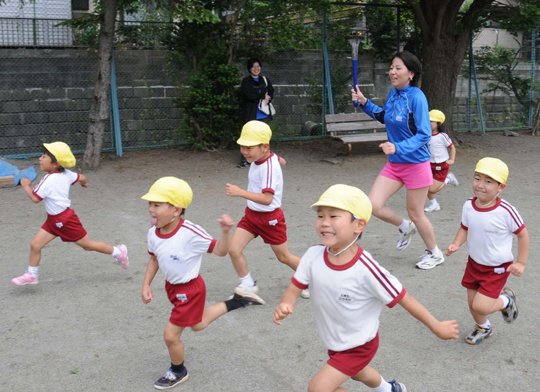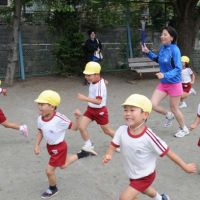In a tranquil neighborhood surrounded by green mountains in Kamakura City, Kanagawa Prefecture, near a trickling brook and houses with colorful gardens, a group of excited children, aged 4 and 5, emerged from Kobato Nursery school, and headed for a nearby park.
All they had been told was that they were going to meet some mystery guests. They waited in the park with anticipation.
Suddenly, a bright torch flame came dancing along the street. Eyes popped and jaws dropped as Japanese and foreign joggers ran into the park wearing matching uniforms and big smiles.
They were the runners of the World Harmony Run, doing their part for the annual global torch relay that takes place in over 100 countries.
Started in 1987 by Indian spiritual guru Sri Chinmoy to teach children the message of world peace through sport, the event this year celebrated its 13th run in Japan.
"Running is a really simple act, but also a powerful way of creating a feeling of oneness, regardless of appearance or background," said Harashita Sunaoshi, lead organizer of this year's World Harmony Run Japan, which was joined by Czech, Mongolian and Japanese volunteers.
"Children don't need reason or logic — they just grab the torch and run, sing or smile together, and in that time we all share the same hopes and dreams," Sunaoshi said.
The World Harmony Run conducts a global-scale relay on alternate years. In other years, individual countries also organize regional runs with more of an emphasis on cultural exchange than on the running.
Last year, the Japan team ran from Hiroshima to Tokyo in 11 days, but this year, the runners, officially supported by Kamakura City, carried the "harmony torch" to eight schools and nurseries around the Kamakura area in early June and met some 600 children.
Kobato Nursery was the penultimate stop for the joggers on a long day that started at the Great Buddha at Kotokuin Temple. Nevertheless, the runners were not lacking for an enthusiastic audience. The 30 or so youngsters, clad in bright outfits, with yellow hats and red shorts, gave imaginative answers to questions quizzing them on the runners' homelands.
When the Mongolians hinted that their country was north of China, the children guessed "Italy."
When Sunaoshi asked where they thought the Czech runner came from, they hedged their bets with "Earth?"
"Our motto is 'Harmony Begins With Me,' " Sunaoshi explained once the introductions were over. "You need to have harmony within yourself first, before you can be friends with other people."
The children sang and danced to the World Harmony Run theme song, accompanied by traditional Indian instruments, and learned the group's motto in English, Czech and Mongolian.
Nothing was quite as mesmerizing for the children as the large torch and its flickering flame. As they formed a large circle and took turns holding the torch to make a wish for peace, the silence dared any cynical adult to laugh at what for the children was very serious business.
"The most important thing for young children is to meet good people; experiences like this they will remember all their lives," said the nursery's principal Yukie Iino as she looked on. She mentioned that the children at Kobato also receive tea-ceremony lessons.
For 32-year old Karel Svadlenka from the Czech Republic, it was the runners themselves who were given great memories to treasure. "The teachers at Kobato were particularly brilliant, and the kids were adorable," he said.
Svadlenka has participated in the World Harmony Run for more than a decade, in Europe as well as Japan, where he has now lived for five and a half years. He is currently a mathematics researcher at Kanazawa University, Ishikawa Prefecture.
Akanola Tsogtbaantar Norov from Mongolia, aged 38, is also a World Harmony Run veteran, having participated every year for 12 years. Last year, he ran 450 km in Mongolia as well as running the relay in Japan.
"The children are so cheerful and take everything into their hearts. When you're in the world of work you get stressed, but you forget all that," he said. Norov first came to Japan to study, and now works at a Japanese company.
The runners' final destination was Iwase Kodomo Kaikan, an after-school care center for primary-school-age children.
The volunteers adapted the program to better suit their slightly older participants, making their dance more complex and letting the children hold the torch while running circles in the playground. The children welcomed the World Harmony runners with banners and presented them with handmade medals at the end.
"We didn't know quite what to expect," said Kodomo Kaikan assistant manager Yoko Yamada, "but I thought it was a great opportunity to meet foreigners,"
For 25-year old Mongolian student Baast Burmaa, the smaller scale of this year's relay meant she could join the team for the first time. "To run long distances you need some training, but this was fine. The team got on really well, and the children's Mongolian pronunciation was just amazing," she said.
World Harmony Run Japan is planning a national-scale torch relay next year. For more information, visit the official Web site at www.worldharmonyrun.org or e-mail [email protected].






















With your current subscription plan you can comment on stories. However, before writing your first comment, please create a display name in the Profile section of your subscriber account page.